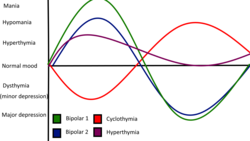Hyperthymic temperament

Editor-In-Chief: Prab R Tumpati, MD
Obesity, Sleep & Internal medicine
Founder, WikiMD Wellnesspedia &
W8MD's medical weight loss NYC, sleep center NYC
Philadelphia medical weight loss and Philadelphia sleep clinics
| Hyperthymic temperament | |
|---|---|

| |
| Synonyms | N/A |
| Pronounce | N/A |
| Specialty | N/A |
| Symptoms | Persistent positive mood, high energy, sociability, talkativeness |
| Complications | Bipolar disorder, substance use disorder |
| Onset | Adolescence or early adulthood |
| Duration | Chronic |
| Types | N/A |
| Causes | Genetic predisposition, environmental factors |
| Risks | Family history of mood disorders |
| Diagnosis | N/A |
| Differential diagnosis | Cyclothymic disorder, bipolar disorder, attention deficit hyperactivity disorder |
| Prevention | N/A |
| Treatment | Psychotherapy, mood stabilizers |
| Medication | N/A |
| Prognosis | N/A |
| Frequency | Unknown |
| Deaths | N/A |
Overview of hyperthymic temperament
A hyperthymic temperament is characterized by an excessively positive mood and disposition. Individuals with this temperament tend to be highly energetic, sociable, and optimistic. This temperament is considered one of the temperament types in psychology and is often associated with bipolar disorder and other mood disorders.
Characteristics[edit]
People with a hyperthymic temperament often exhibit the following traits:
- Increased energy levels: They tend to have more energy than the average person, often leading to high levels of productivity and activity.
- Sociability: Individuals are typically very outgoing and enjoy social interactions.
- Optimism: They generally have a positive outlook on life and are resilient in the face of adversity.
- Talkativeness: A tendency to engage in conversation frequently and enthusiastically.
- Impulsivity: They may act on impulse without considering the consequences.
- Reduced need for sleep: Often requiring less sleep than average, which can contribute to their high energy levels.
Clinical Implications[edit]
While a hyperthymic temperament can be advantageous in many situations, it can also pose challenges. The high energy and impulsivity associated with this temperament can lead to difficulties in maintaining stable relationships and adhering to long-term goals. In some cases, it may predispose individuals to bipolar disorder, particularly bipolar II disorder, where hypomanic episodes are more common.
Management[edit]
Management of a hyperthymic temperament involves recognizing the potential for mood disorders and implementing strategies to maintain balance. This may include:
- Psychotherapy: Engaging in cognitive behavioral therapy (CBT) to develop coping strategies.
- Lifestyle modifications: Ensuring adequate sleep, regular exercise, and a balanced diet.
- Medication: In some cases, mood stabilizers or other medications may be prescribed to manage symptoms.
See also[edit]
Ad. Transform your life with W8MD's Budget GLP-1 injections from $49.99


W8MD offers a medical weight loss program to lose weight in Philadelphia. Our physician-supervised medical weight loss provides:
- Weight loss injections in NYC (generic and brand names):
- Zepbound / Mounjaro, Wegovy / Ozempic, Saxenda
- Most insurances accepted or discounted self-pay rates. We will obtain insurance prior authorizations if needed.
- Generic GLP1 weight loss injections from $49.99 for the starting dose of Semaglutide and $65.00 for Tirzepatide.
- Also offer prescription weight loss medications including Phentermine, Qsymia, Diethylpropion, Contrave etc.
NYC weight loss doctor appointmentsNYC weight loss doctor appointments
Start your NYC weight loss journey today at our NYC medical weight loss and Philadelphia medical weight loss clinics.
- Call 718-946-5500 to lose weight in NYC or for medical weight loss in Philadelphia 215-676-2334.
- Tags:NYC medical weight loss, Philadelphia lose weight Zepbound NYC, Budget GLP1 weight loss injections, Wegovy Philadelphia, Wegovy NYC, Philadelphia medical weight loss, Brookly weight loss and Wegovy NYC
|
WikiMD's Wellness Encyclopedia |
| Let Food Be Thy Medicine Medicine Thy Food - Hippocrates |
Medical Disclaimer: WikiMD is not a substitute for professional medical advice. The information on WikiMD is provided as an information resource only, may be incorrect, outdated or misleading, and is not to be used or relied on for any diagnostic or treatment purposes. Please consult your health care provider before making any healthcare decisions or for guidance about a specific medical condition. WikiMD expressly disclaims responsibility, and shall have no liability, for any damages, loss, injury, or liability whatsoever suffered as a result of your reliance on the information contained in this site. By visiting this site you agree to the foregoing terms and conditions, which may from time to time be changed or supplemented by WikiMD. If you do not agree to the foregoing terms and conditions, you should not enter or use this site. See full disclaimer.
Credits:Most images are courtesy of Wikimedia commons, and templates, categories Wikipedia, licensed under CC BY SA or similar.
Translate this page: - East Asian
中文,
日本,
한국어,
South Asian
हिन्दी,
தமிழ்,
తెలుగు,
Urdu,
ಕನ್ನಡ,
Southeast Asian
Indonesian,
Vietnamese,
Thai,
မြန်မာဘာသာ,
বাংলা
European
español,
Deutsch,
français,
Greek,
português do Brasil,
polski,
română,
русский,
Nederlands,
norsk,
svenska,
suomi,
Italian
Middle Eastern & African
عربى,
Turkish,
Persian,
Hebrew,
Afrikaans,
isiZulu,
Kiswahili,
Other
Bulgarian,
Hungarian,
Czech,
Swedish,
മലയാളം,
मराठी,
ਪੰਜਾਬੀ,
ગુજરાતી,
Portuguese,
Ukrainian